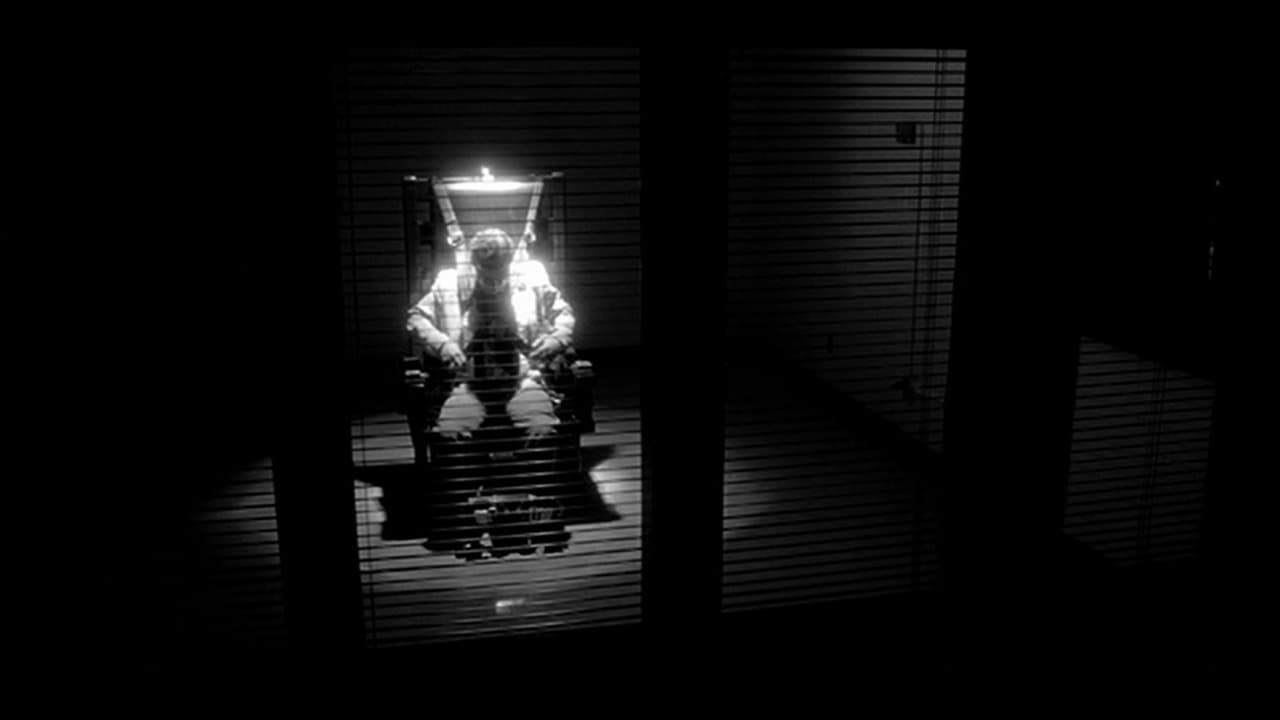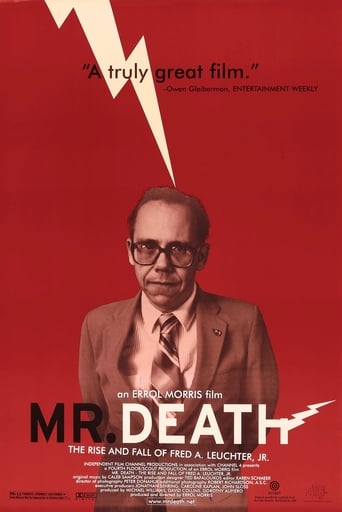Borgarkeri
A bit overrated, but still an amazing film
Brendon Jones
It’s fine. It's literally the definition of a fine movie. You’ve seen it before, you know every beat and outcome before the characters even do. Only question is how much escapism you’re looking for.
Teddie Blake
The movie turns out to be a little better than the average. Starting from a romantic formula often seen in the cinema, it ends in the most predictable (and somewhat bland) way.
Tyreece Hulme
One of the best movies of the year! Incredible from the beginning to the end.
Uwontlikemyopinion
Errol Morris documents a cinematic portrait of timid eccentric Fred A. Leutcher, Jr. The rise of this man begins with his successful career as an American execution device and designer (the electric chair, lethal injection, and the gallows). And his fall, midway through designing a better way to use the noose, or "gallows," he's employed by Holocaust deniers to collect "proof" that the gas chambers in Auschwitz were intended for that purpose.
Mostly through close up and dreamlike montages, Leutcher's personae becomes much of a lark. How is the audience supposed to view this character? Is he good or evil? That's where Errol Morris shines in this ambiguous documentary presenting the difficulty of simplistic moral values. Another takeaway from the documentary is the irony that eviscerates Leutcher's life. For instance (SPOILERS), the states that hire hime for these capital punishment devices later refuse to deal with him once he writes the "Leutcher Report" and makes connections with Neo-Nazis and Holocaust deniers.
Much of this documentary depends on the individual's amusement with the character, which can be sometimes difficult because he is an oddball and his ramblings are quite dispiriting (there's a scene with an elephant being electrocuted). Also, one of my pet peeves in talking head documentaries consists of an edit being obvious to cut out extraneous dialogue or the scene cuts to black to reorientate the viewer back to the story, this happens several times. Although Mr. Death succumbs to some distressing moments, Errol Morris captivates his audience with irony and judgmental restraint to allow the audience to make our own impressions of this milquetoast.
Alex Deleon
"Mr. Death", viewed at Berlin 2000 in the new Potsdmer Platz surroundings, is an astounding feature length interview focusing on Fred Leuchter, an American engineer who used to design execution equipment for the death rows of American prisons. Enlisted by a Holocaust Denial group to 'test' the gas chambers of Auschwitz he found "no traces of cyanide" thus supporting the denial position that the entire Holocaust was a hoax. Confronted by evidence from other scientists indicating that his testing methods were ridiculously superficial – in fact, downright unscientific – he just laughs this off, reveling in his new-found notoriety as a "hero" of the denial movement. More than a political film, this is a razor- sharp case study of a bizarre personality totally out of touch with reality, a walking nut-case whose warped logic is readily accepted by those who want to believe what they want to believe. Frightening, moreover, in how it shows the thinness of the line between credibility and incredibility when it comes to the structuring of public opinion.Many Jews have attacked this film claiming that it makes too strong a case for denial, when in fact the subtle but clear intention of the filmmaker is to point up the twisted logic of the denier. To accomplish this you have to let the subject have his say, but the logic of the insane can sometimes sound uncomfortably compelling – and there's the rub. Director Errol Morris was also the maker of the extraordinary 1991 documentary on Cambridge cosmologist Stephen Hawking entitled "A Brief History of Time". Dr. Death should be required viewing in Yeshivas and Churches alike.
talkstock2me-1
This is a movie in which the protagonist appears to be little more than an eccentric and (at first) "humane" engineer of killing machines. By the end of the movie they are seen as much less - or much more. This is the story of a person who's aspiration for recognition get the better of them and the costs of those aspirations. Morris demonstrates better than in almost any of his other documentaries why he is a master of this form. Mr. Leuchter takes an abundance of rope with which to hang himself and insists he 'did the right thing'; though it seems amply obvious to almost anybody watching this fascinating movie that he had no business involving himself in the "project" in the first place. He had no idea that the stakes he was playing for were so large and his failure to accept his limited knowledge effectively ruins what was for him, a very lucrative hobby. Maybe a better name for this remarkable documentary would be *Hubris*, since Mr. Leuchter lacks it in spades...
ttothedawn
In the film Mr. Death, Fred Leuchter gets a chance to defend himself, and that he does as a time consumed lunatic. A man who has too much time on his hands to create wicked killing machines and to debate any plausible explanation of history. The film maker allowed a chance for Leuchter to explain himself in his own words and to defend his name to the public, however, the music and the footage allowed no justice for Leuchter whats so ever. The music alone was creepy enough to make the viewer put off a feeling of disgust with the quick back and forth shots of Leuchter's crazy facial expressions. The film showed how sneaky and easily Leuchter was living his life and making his living until he stuck his nose where it didn't belong, craved the "bad" attention and ruined everything. The film's ending seemed to be tragic for Leuchter, however, the camera produced more of a mournful expression than Leuchter himself. I actually didn't mind watching this film, I am now knowledgeable on the kinds of people that create the "killing machines." At the end of the film, I felt a little sad, a little creeped out, but happy it was over.

